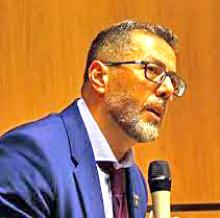You are here
How the Global South helped Palestine challenge Western institutions
May 29,2024 - Last updated at May 29,2024
Even the most optimistic of political analysts did not expect that the International Criminal Court’s (ICC) chief prosecutor would be uttering these words:
“I have reasonable grounds to believe that Benjamin Netanyahu [...] and Yoav Gallant [...] bear criminal responsibility for [...] war crimes and crimes against humanity...”
Aside from the two Israelis, Karim Khan has included three Palestinians on his application requesting arrest warrants from the ICC’s Pre-Trial Chamber. That is important, but we must remember that, per western thinking, Palestinians have always been the guilty party.
Evidence of the above claim is that the west has long portrayed Israel as a country at war in self-defense. Consequently, Palestinians - though occupied, dispossessed and disinherited — are the aggressors.
This bizarre logic is not strange if seen within the larger power paradigm which has defined the west’s relationship with Palestine and, by extension, the Global South.
For example, out of 54 individuals indicted by the ICC since its inception in 2002, 47 are Africans, a fact that has rightly agitated governments, civil societies and intellectuals throughout the Global South for many years.
On western duplicity, Aimé Césaire, a Martinican intellectual and politician, wrote, “they tolerated [...] Nazism before it was inflicted on them, they absolved it, shut their eyes to it, legitimised it, because, until then, it had been applied only to non-European peoples”.
WWII inspired new thinking on the part of the west. The International Court of Justice (ICJ), the ICC, among others, have been the direct outcome of that terrible western war. It was the west’s way of trying to protect the new status quo which was established by the victors.
The Global South joined in anyway. “Africa had a particular interest in the establishment of the court, since its peoples had been the victims of large-scale violations of human rights over the centuries,” a representative of the Organisation of African Unity said in Rome, the birthplace of the Rome Statute, in 1998.
Predictably, however, the ICC turned into a platform where former colonial masters cast judgment on the non-European world. In that sense, justice was hardly served.
As always, Palestine has, and continues to serve as the litmus test of the international order. For over 15 years, Palestinians have been seeking to enlist the ICC’s help to hold Israel accountable for its military occupation and various crimes in Palestine.
The Palestinians have done so simply because any attempt at establishing a practical mechanism to end the Israeli occupation through the United Nations has been met with a cruel American veto.
As the Israeli occupation turned into a permanent one, and racial apartheid spread its tentacles to cover every inch of Palestine, the US’ support of Israel has become a first line of defence against any international criticism, let alone action, aimed at reining in Israel.
Even though the US has refused to join the ICC, it still has great influence over the organisation, either through sanctions or pressure imposed by its allies which are members of the Court.
Thus, the ICC procrastinated. Decisions that should have taken only months, took years to be made. The institution, which was created to deliver swift justice, became a bureaucratic legal apparatus that did everything in its power to escape its responsibilities towards the Palestinians.
The persistence of Palestinians and the massive solidarity they have obtained from countries throughout the Global South, eventually paid off.
In 2009, Palestinians filed their first application to join the ICC. Yet, it took over three years for then-Prosecutor Luis Moreno Ocampo to reach his decision, in 2012, denying Palestinians such urgent membership on the account of their legal status as mere observers at the UN.
The rest of the world rallied behind Palestine again and, later that year, the UN General Assembly granted Palestine its ‘non-member observer state’ status.
It took another three years for Palestine to officially join the ICC. Four years later, in 2019, then-Prosecutor Fatou Bensouda stated that the so-called statutory criteria needed to begin an investigation in Palestine were satisfied. But, instead of opening an investigation, Bensouda sent the matter back to the Pre-Trial Chamber for further confirmation.
An official investigation was not opened until March 2021, but was grounded to a halt when Karim Khan replaced Bensouda as the chief prosecutor later that year.
So, what happened between March 2021 and May 20, 2024 that allowed the ever-reluctant Khan to go as far as requesting arrest warrants?
First, the Israeli genocide in Gaza, where victims are measured in the tens of thousands.
Second, the credibility of the west-enshrined legal system which has governed the world since WWII, was at stake. This explains the emphasis made by Khan in his May 20 statement: “If we do not demonstrate our willingness to apply the law equally [...] we will be creating the conditions for its collapse.”
Third, the solidarity of the Global South, which has served as the backbone of all Palestinian efforts at international legal institutions.
After decades of a one-sided approach to global conflicts, the pendulum is finally shifting. Indeed, when we say that Gaza is changing the world, we mean it.
Ramzy Baroud is a journalist, author and the editor of The Palestine Chronicle. He is the author of six books. His latest book, co-edited with Ilan Pappé, is “Our Vision for Liberation: Engaged Palestinian Leaders and Intellectuals Speak Out”. His other books include “My Father was a Freedom Fighter” and “The Last Earth”. Baroud is a non-resident senior research fellow at the Centre for Islam and Global Affairs. His website is www.ramzybaroud.net













Add new comment